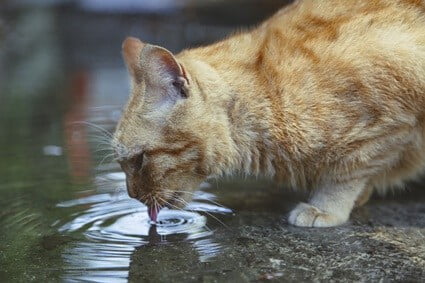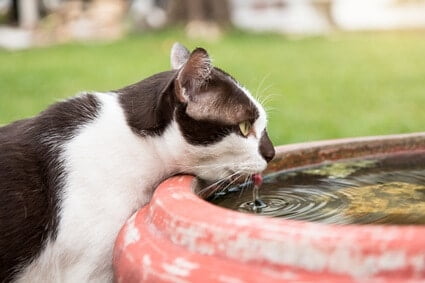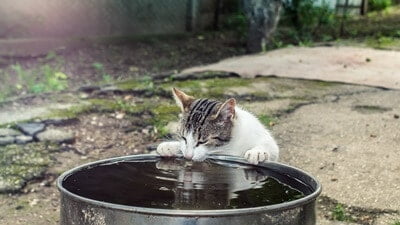Cats have been living alongside humans for thousands of years. While this is a long time, it’s not long enough for cats to fully adjust to domestic life. This results in cats developing odd habits, like drinking dirty water. Even if you provide fresh, clean water, your cat may still choose to drink from a plant pot, rain barrel, or puddle.
Cats will drink dirty water when they dislike the water you’ve provided, drinking vessel, or where the bowl is placed. In the wild, cats refuse to drink where they hunt because animal carcasses would contaminate the water and make them sick. So, if a domestic cat’s bowl is near its food, it may instinctually refuse to drink.
Plastic containers get scratched over time, allowing bacteria to build up in the small crevices. Since cats have sensitive noses and taste buds, they’ll refuse to drink clean water if it’s in a contaminated bowl. As cats dislike lapping up water from bowls where their sensitive whiskers touch the brim, bowl shape is a factor.
Why Do Cats Drink Muddy Water?
Even when cats have better options, they may still prefer to drink muddy, stagnant water. Owners provide bowls filled with fresh drinking water, but their cats turn up their noses.
Instead, cats drink out of:
- Toilets
- Sinks
- Houseplants
- Puddles
- Rain barrels
- Fish ponds
- Drains
It may seem like your cat’s being rebellious. However, it’s natural for cats to take their chances with muddy water over what you’ve put in their drinking bowls.
Most reasons are connected to instinct. Cats haven’t turned their back entirely on old notions and cues. After all, they have yet to be completely domesticated.
Your cat prefers to drink muddy water for the following reasons:
Water Bowl Too Close To Food Bowl
Cats instinctively avoid water sources that are too close to their food.
When cats hunt animals in the wild, the carcasses decompose and rot. Cats know that water sources near dead animals contain bacteria. So, they go elsewhere to drink.
Of course, many cats eat all the food in their bowl, and it doesn’t contaminate their water. Nonetheless, there’s still something there that tells them to drink water as far from their feeding area as possible.
Water Bowl Is Plastic
Plastic containers may get scratched or marked by your cat, dishwasher, or you. When this happens, bacteria can develop in the cracks. Even if you routinely clean it, the microbes can survive.
Even if you don’t spot a crack, your cat will notice. Cats have a good sense of smell, and their whiskers provide sensory input, much like human fingertips.
Your cat may understand that its water has been accidentally contaminated or will be soon. Instead of taking the risk, they’ll decide to seek water elsewhere.
Water Bowl’s Shape Isn’t Right
With that in mind, cat whiskers are very sensitive. If they continuously brush against the water bowl as the cat drinks, this will lead to irritation.
That’s especially common for deep bowls or bowls with a narrow brim. Instead of being tickled or poked every time it drinks, the cat will choose another option.
Cats Like Multiple Drinking Sources
Cats don’t always drink from the same water source. The location may not always be available, there may be predators nearby, and it’s always good to have options.
Domestic cats are more likely to drink water if they have to search for it. It’s in their nature to look for their resources and pretend they’re hunters trying to survive rather than pampered house pets.
Water Sitting in Bowl For Too Long
Cats are fussy and refuse to drink water that’s been sitting out for too long.
After a few hours, dust particles and bacteria will cover the water’s surface. Even though muddy water that cats drink is far dirtier, it might smell more appealing than what’s in the bowl.
Water Doesn’t Taste Right
Human drinking water is often purified with chemicals, which cats can detect. Although they’re harmless to humans, your cat may think that the water is contaminated or toxic.

Bowl Wasn’t Cleaned Correctly
If the bowl wasn’t cleaned right, your cat will refuse to drink from it. This doesn’t just include bowls that are washed badly, but also those washed with chemicals.
Remember, cats have sensitive noses, so don’t use bleach or harsh cleaning products to wash the bowl. If that smell isn’t completely removed, your cat won’t drink from it.
Do Cats Like Stale Water?
Animals drink from running streams and rivers. Bacteria and dust are more likely to settle in stagnant water.
As such, cats are usually drawn to sources with moving water (like faucets) because they think it’s safer to drink. Running water also contains more oxygen than still water. This can make it taste better.
Do Cats Prefer Dirty Water?
Cats will always drink from a source they believe is safe.
According to Veterinary Immunology and Immunopathology, even though cats have an innate antiviral immune system, they like to take the safer option.
If the condition or position of the water bowl is unsatisfactory, the cat will drink from somewhere else. Even if you change the water, once a cat decides that bowl is off-limits, it’ll be hard to change its mind.
Cats don’t understand that certain water sources, such as toilet bowls, are unhealthy to drink from. In their mind, their water bowl is contaminated. Any other water that smells or tastes different will be far more acceptable.
Likewise, what’s clean for cats is not always what’s clean for humans. Good-smelling water may still include chemically-treated water or water that’s contaminated with toxic liquids.
Traces of salt and minerals will also be appealing to cats since they smell more earthy and natural.
Why Do Cats Drink Plant Water?
Plant water usually contains more oxygen and minerals than tap water.
This enriches the water, making it taste and smell more organic, so cats prefer this over human drinking water. Our water is usually purified with chemicals and over-filtered.
Cats get their minerals from the freshwater they find in rivers and streams. Depending on their diet, domestic cats lack any sources of minerals, yet their bodies still require it as much as we do.
Cats will smell the microbes that plant water contains and be drawn to the earthy smell. As long as the plant isn’t dangerous for the cat to eat, it’s healthy to drink plant water.
This is especially true if the cat is feral, as it’ll have a more robust immune system due to living on the streets.
How To Get A Cat To Stop Drinking Dirty Water
Cats can become ill from drinking dirty water, so discourage this behavior and drive your cat back toward its clean water bowl.
The best ways to accomplish this include:
- Getting a shallow bowl with a wide brim
- Cleaning the bowl every day (no bleach)
- Getting a ceramic, metal, or glass bowl
- Placing the bowl away from its food
- Placing multiple bowls around the house
- Changing the location of the bowl whenever the cat gets bored of it
- Pouring new water every 24 hours
- Getting a water fountain
- Using rainwater instead of tap water (only if you live in a rural area)
If you decide to get your cat a water fountain, ensure that it doesn’t have a plastic dispenser or container. Water fountains made entirely of ceramic or metal are more expensive than plastic ones.
Cats are finicky. They might dislike drinking from bowls regardless of how appealing you make them. If your cat refuses to drink water from a bowl, no matter what, you can always pour some water into the wet food.
Is it Safe for Cats to Drink Rainwater?
Rainwater is safe for cats to drink if it meets two criteria:
- It’s collected directly from the sky
- The area has minimal pollution
Rainwater is distilled and purified by being evaporated by the sun. However, rainwater picks up contamination in the air as it falls. If you live in a big city or near a factory, it’s not advised for you to collect rainwater as the pollution will make it harmful.
If you live in an area with clean air, you should collect the rainwater carefully in a clean:
- Glass
- Metal container
- Ceramic container
The rainwater should fall directly from the sky. Once it touches the ground or your roof, consider it contaminated. Don’t let your cat drink it.

Can Cats Get Sick from Drinking Dirty Water?
The most common kind of infection a cat will get is leptospirosis. It’s a bacterial infection present in:
- Subtropical environments
- Marshy, muddy waters
- Heavily inundated areas, such as crop farms
Outdoor cats are more likely to get infected. According to the Journal of Comparative Pathology, juvenile cats that haven’t been vaccinated are at the greatest risk, especially during the rainy season.
Can Cats Get a UTI From Dirty Water?
Cats cannot get a UTI from dirty water because water gets absorbed into the bloodstream once it reaches the stomach. From there, it goes to the kidneys. By then, all the bacteria and germs are gone.
If the water were in any way contaminated, it would affect the stomach and intestines, not the bladder.
Cats get UTIs due to:
- Lack of hydration
- Diabetes
- Fungal infections
Can Cats Get Worms from Dirty Water?
Cats can get worms from dirty water, the most common types being guinea worms and tapeworms. Stagnant water, especially in warm climates, is a breeding ground for flies and fleas.
This usually happens when cats:
- Drink from puddles outside during the summer
- Are left by themselves for several days if the owners are away
Flies and other pests settle on the stagnant water. If that’s the only source of hydration until the owners return, the cat has no other choice but to drink what’s available.
Provide your cat with clean, safe water, even if it refuses to drink it. You can also make water more appealing to cats.


Your mention of cats being attracted by the taste of salt has me wondering. Our cats don’t like the mains tap (faucet) water due to whatever chemicals the supplier has added. Therefore, I’m trying bottled water as it’s got no additives, although it may taste from the plastic bottles. My thinking, and my question, is whether I could make bottled water more appealing by adding a grain or two of salt per litre?